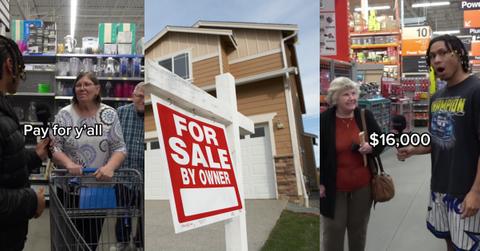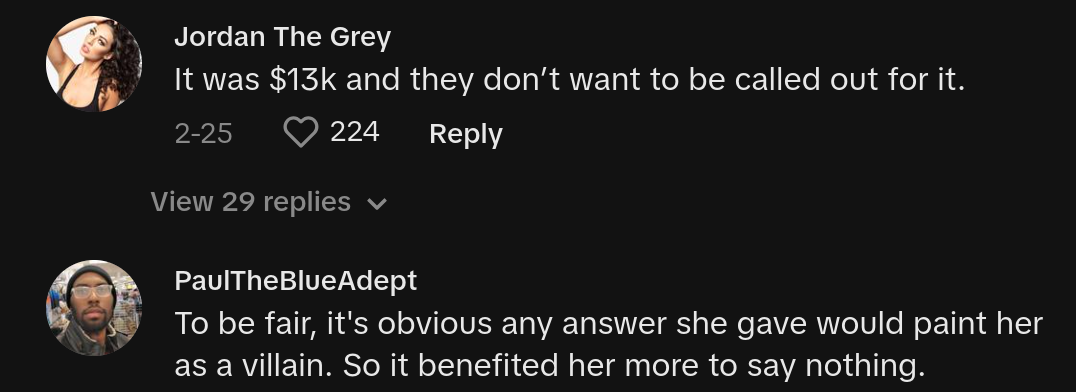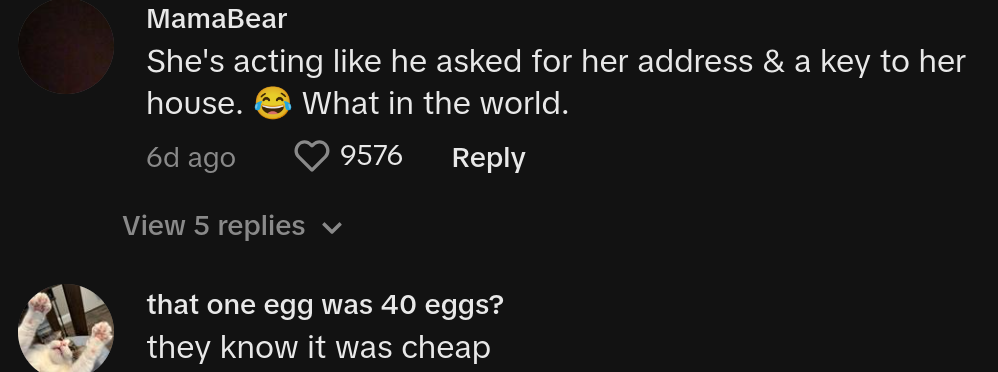“Boomers Lived in the Easiest Era” — Man Asks Boomers How Much They Paid for Their First Home
"It was $13k and they don’t want to be called out for it."
Published March 12 2024, 9:04 a.m. ET

An Influencer by the name of Delo (@dangeloruff) questioned a series of folks who appear to be older than him, asking what they paid for their first home, and the answers they gave shocked viewers, with many claiming that it was much easier to thrive financially as a "boomer" than any other era.
The median price of a home in the United States these days is $395,100, as of this writing according to Fast Company. The US Market Historical Conditions database stated that the median price of a home in 1984 throughout the country was $79,900.
"How much did you pay for your first house?" the man on the microphone asks a man in a blue shirt pushing a cart through the Home Depot in one of his videos.
"$37,000 for it," the man replies, leaving the Influencer with his jaw-dropping to the ground.
"But that was in 1980," he concedes. As of this writing, according to SavvyDollar, $37,000 in 1980, adjusted for inflation, is worth $147,973.95, or around four times what our currency is worth today.
He then asks the woman walking behind the gentleman if that was her first house, but the man quickly explains that the woman walking with him is his mother-in-law. So the TikToker wanted to know how much she paid for her first home: "My first house was $16,000," she says, smiling into the camera. Again, this leaves the TikToker speechless as he looks into the camera.
Delo kept the series going in another video where he approached another couple shopping in another store: "How much did you pay for your first house?" he asked the couple. The woman, who is wearing a red jacket turns and answers the man: "$25,000."
Delo stammers a little bit towards the camera before turning back to the couple, "What year was this?" he asks, before the woman ruminates a bit before answering: "Oh my Gosh, 45 years ago."
"We on TV?" the man who is with her asks Delo.
"Yeah what you gotta say to them," Delo tells the couple, before the woman responds, "Hopefully not YouTube."
"Nuthin' really," the man says before the video cuts out.
In another video that appears to have been recorded at a Walmart location, Delo poses the same question to another woman who stands in front of her cart u — an assortment of tumblers and pitchers are behind her.
"No," the woman says as she backs away from the camera and begins to walk away from the man who posed the question.
"We're not gonna do that," the woman says as she pushes her cart away from the man. "We're not gonna participate," the man who is with the woman tells Delo.
Prior to him stating that he and the woman he is with aren't going to "participate" in the interview, it seemed as if he very much wanted to participate, according to several other users on the platform who were watching his reaction.
"We all know he wanted to participate," one person said.
Others thought they clocked an unhealthy dynamic between this man and the woman: "My boi been on leash since the 80s," one person wrote.
While another said, "'We don’t wanna participate' Someone save this man"
However, others thought that the woman's reasoning for not wanting to share how much they purchased their home for was readily apparent: it's because they didn't want folks to know how little they paid for it and how much they ended up selling it for.

"boomers lived in the easiest era," one person said, stating that making, earning, and keeping a living as a boomer was nowhere near as tall of a fiscal order as it is today.
Someone else replied: "Because it was probably $25k and they sold it for $700k"
Which was a thought that someone else echoed, writing: "She bought it for 30k in 1985 sold in for 500k in 2022-23 she don’t wanna spill tea"

It's not difficult to understand the frustrations that many TikTokers expressed upon hearing the amount of money the folks in his videos revealed they paid for their homes. The housing market in American is so bad right now that it was actually easier for folks to afford a home during the Great Depression than it is today.